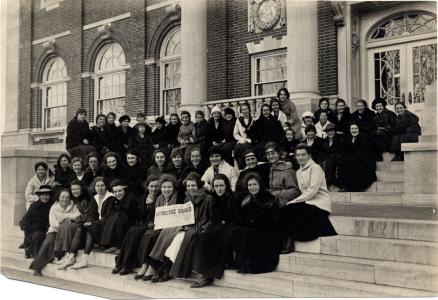
The Tufts Archival Research Center (TARC to our friends) houses hundreds of collections chronicling the history of Tufts University, collecting records of its faculty, staff, students and administrators as well as stewarding the administrative records of the University and all of the colleges within it. For Women’s History Month, we wanted to highlight our collection of records Jackson College for Women!
Named after Cornelia Maria Jackson, who bequeathed funds after her death in 1895 to Tufts to help "remove the disabilities of women," Jackson College was founded in 1910 as what was known as a “coordinate college” to Tufts. An alternative to both women's colleges and fully coeducational schools, coordinate colleges provided women with a separate, and supposedly equal, education at a women's college that existed in conjunction with a men's school.
Readers familiar with Tufts history might have been pulled up by that 1910 date—women had first been admitted to Tufts College in 1892, some forty years after the college's founding. Ms. Jackson’s bequeathal had, in fact, been intended as additional support for women who were already at Tufts, not the creation of a separate institution. But women’s presence had been a continual source of debate among the faculty, administration, and Trustees who saw women as an unnecessary and distracting influence on the University’s culture. As an alternative to coeducation, President Frederick Hamilton, himself an opponent of coeducation, argued for the establishment of a separate, coordinate college. This compromise resulted in the establishment of Jackson College. Caroline Davies, the first woman to serve on the Tufts faculty, and the first female administrative officer, was named as the first dean.
Segregated instruction lasted only a few years, and by the time the catalogue for 1913 was published all mention of separate classes for women was gone. From 1917 to 1963 women graduates received Tufts degrees only. From 1963 until 2002, women's diplomas carried an identification of Jackson College. Socially, however, the concept of Jackson College remained strong until the 1970s. Jackson College had its own student government, clubs, and other student organizations. The Jumbo, the undergraduate college yearbook revived in 1917, had separate sections for Tufts College and Jackson College through the 1960s.
Our Jackson College for Women collection documents women’s history at Tufts even before Jackson’s founding (including debates about how the University should approach that tricky women problem it had been dealing with since going coeducational) up to 1985. It especially represents the story of students’ lives on campus and student activities specific to Jackson College with records and photographs of the student government, social groups, and student groups. For the sports-minded researcher (we are getting started on March Madness after all!) there are three scrapbooks of the Jackson College Athletic Association, which includes clippings and photographs of athletic events.
You can learn more about the specifics of what’s available in the Jackson College records in the finding aid to the collection here: https://archives.tufts.edu/repositories/2/resources/574#.
Many (but not all!) of the photographs in the collection are available in the Tufts Digital Library (https://dl.tufts.edu/). If you only want to look through photographs from this collection (as opposed to the hundreds of other Jackson-related photographs that TARC holds), just search for the collection number, UA033, in the main search bar.







